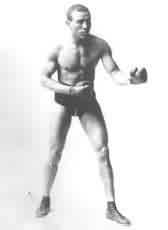
| |||
| COMMENT | CONTACT | BACK ISSUES | CBZ MASTHEAD |

|
Mann Act and Jack JohnsonBy Tom DonelsonEditor's note: Jack Johnson was one of the great heavyweights in the early part of this century. He was also the first African-American to be Heavyweight champion, something not tolerated very well by a significant portion of white America. The Mann Act was used to hound Jack Johnson and eventually put him in jail. Who is James Robert Mann and why should we care about him as sports fan? For one, this congressman would have a significant effect upon one of America's great sportsmen in the early 20th century. Representative Mann fought for women suffrage and in 1910, he pushed a bill that bears his name preventing under heavy penalties the transportation of women from one state to another for immoral purposes. This act, began as movement to cripple prostitution, would end up as bill that would prohibit consensual sexual conduct outside of marriage. In the early part of the century, the prohibition movement extended from movement to ban alcoholic beverages, recreational drugs and other vices like sex. Fornication was made illegal in many states. By 1920, nearly half of the states regarded habitual consensual sex a punishable act and many of these states, one act was enough to bring conviction. Widespread prohibition against all aspects of sexual activity made enforcement impossible and many juries proved unwilling to convict for illegal sex acts. One boxing historian told me that the only other person ever convicted was the actor Charlie Chaplin. Jack Johnson when he became champion scandalized America. According to Boxing historian Mike DeLisa, there were some within the black community that were equally scandalized by his behavior as many whites. He openly dated white women and he even married some of them. When Johnson defeated James Jeffries in 1910, the search for the great White Hope began. While promoters conducted tournaments to find the white boxer who could challenge Johnson, others decided to use the law- the Mann Act - to cripple the Champion. For many blacks, Johnson restored pride to them. The following poem detailed the feelings that many blacks had after Johnson slaughtered Jeffries: O my Lord What a morning, O my Lord, What a feeling, When Jack Johnson Turned Jim Jeffries' Snow-white face to the ceiling. Many whites resented Johnson for his life style and many whites resented the positive effect that he had on blacks after the Jeffries' debacle. In the eyes of many whites, Johnson was the "uppity" black that needed to put back in his place. Johnson was convicted in 1913 for "transporting a woman across state lines for immoral purpose." The woman in question was his fiancée and soon to be his wife. The charges were trumped up and certainly the worst you could say, Johnson was found guilty of having consensual sex with a woman and then taking her cross state lines, which his job demanded. Johnson appealed this decision but in the meantime, fled the country. He first went to Canada, then to Europe, Mexico and South America. He defended his title in Paris twice and finally he agreed to fight Jess Willard in Havana, Cuba. Under a scorching sun in a fight scheduled for 45 rounds, Johnson started quick against the taller and bigger Willard. He dominated those rounds but as the rounds went by, his years of running, lack of good training and age caught up with Johnson. After the 20th round, Willard began to take command and in the 26th round, he ended Johnson Championship reign. But Johnson fight with the United States government did not end. He returned to the United States in 1920 and served eight months for violation of the Mann Act. While in Prison, he was appointed athletic director of the prison. He continued to fight after he was released from prison but his years as heavyweight contender were over. He finally called it quit in 1928 at the age of 50. He spent the rest of his life as a lecturer and show - business performer. Married three times to white women, he never had children. The Mann Act was originally designed to stop prostitution but it broadened over years to cover consensual sex acts, targeting sex with "minor women." Johnson only real guilt was becoming the Heavyweight champion. His victory over Jeffries sparked race riots and the Texas Legislature banned films of his victories, because of the fear of even more violence. Johnson would die in a car crash on June 10, 1946 near Raleigh, North Carolina. As he was being buried, the Heavyweight championship was in the hand of another black fighter, Joe Louis. Joe Louis was one of America's beloved sport figures and he was the first African- American fighter to be accepted by white sport fans. Johnson, on the other hand, was one of most feared black athlete for he refused to play by the rules of White America. While White America would use trumped up charges to force Johnson out of the country and conspire to take his title, Johnson never surrender to White America. Representative James Mann gave White promoters the legal tool to stop Johnson but they could never take away the fact that a Black man for seven years was the reigning champion and best fighter in the world. History has judged Johnson and they found him to be a great champion. |
||
| Upcoming Fights | Current Champions | Boxing Journal | CBZ Encyclopedia | News | Home |